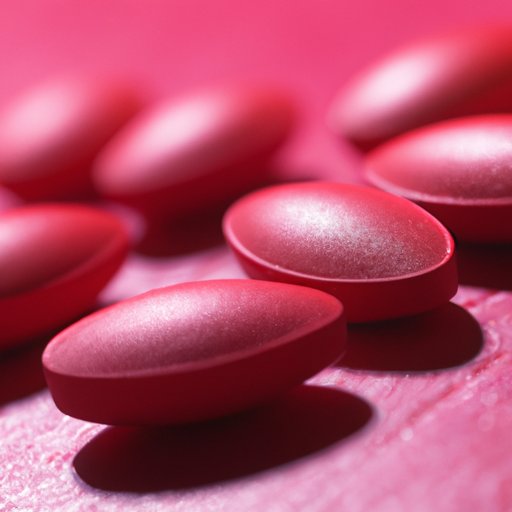
Introduction
Vitamin B12 is an essential nutrient that plays many important roles in the body, including supporting the production of red blood cells and maintaining the health of the nervous system. However, there is some confusion and misinformation about whether vitamin B12 can cause hair loss. This article aims to explore the topic of vitamin B12 and hair loss and provide accurate, helpful information for readers.
The Link Between Vitamin B12 Deficiency and Hair Loss
Vitamin B12 deficiency can cause a wide range of symptoms, including fatigue, weakness, numbness or tingling in the hands and feet, and difficulty maintaining balance. One lesser-known symptom of B12 deficiency is hair loss. This is because vitamin B12 is necessary for the production of red blood cells, which carry oxygen and nutrients to the hair follicles.
When there is a deficiency of vitamin B12, the red blood cells become less effective at carrying oxygen and nutrients to the hair follicles, which can cause the hair to weaken and fall out.
Can High Levels of Vitamin B12 Lead to Hair Loss?
While vitamin B12 deficiency can cause hair loss, there is some evidence to suggest that very high levels of B12 may also be a risk factor for hair loss. This is because excessively high levels of B12 can interfere with the absorption of other important nutrients that are necessary for hair health.
However, the evidence is not conclusive, and more research is needed to fully understand the relationship between high B12 levels and hair loss. It is also important to note that vitamin B12 toxicity is rare and is more commonly associated with excess intake of B12 supplements rather than through diet alone.
The recommended daily intake of vitamin B12 for adults is 2.4 micrograms, which can easily be obtained through a balanced diet that includes foods such as meat, fish, dairy products, and fortified cereals. For those who are unable to obtain enough B12 through their diet, supplements may be necessary.
How Vitamin B12 Plays a Role in Hair Growth and Loss
Vitamin B12 is critical for the production of red blood cells, which deliver oxygen and nutrients to all parts of the body, including the hair follicles. Without an adequate supply of oxygen and nutrients, the hair follicles can become weak and eventually stop producing hair.
In addition, vitamin B12 plays a role in the overall health of the skin, which includes the scalp. A lack of B12 can lead to skin problems that affect the scalp, further contributing to hair loss.
The Benefits of Vitamin B12 for Hair Health
Getting enough vitamin B12 is important for overall health and can also help support hair health. Some of the benefits of B12 for hair health include:
- Improved blood flow to the scalp, which promotes healthier hair growth
- Stronger hair follicles that are less susceptible to breakage
- Improved scalp health and reduced risk of dandruff and other skin conditions that can contribute to hair loss
Including foods that are high in vitamin B12 in your diet can help promote hair health. Some examples of foods that are high in B12 include:
- Beef, liver, and other meats
- Fish and shellfish, such as salmon, tuna, and clams
- Dairy products, such as milk, cheese, and yogurt
- Fortified cereals and nutritional yeast
In some cases, supplements may be necessary to ensure adequate B12 intake. It is important to speak with a healthcare provider before starting any new supplements, as excessive intake of B12 can have negative health effects.
Vitamin B12 and Hair Loss: What You Need to Know
To summarize, vitamin B12 is an important nutrient that plays a key role in hair health. A deficiency of B12 can cause hair loss by reducing the delivery of oxygen and nutrients to the hair follicles. While high levels of B12 may also be associated with hair loss, the evidence is not conclusive.
It is important to obtain adequate B12 through a balanced diet that includes foods such as meat, fish, dairy products, and fortified cereals. For those who are unable to obtain enough B12 through their diet alone, supplements may be necessary.
Treating Hair Loss with Vitamin B12: Experts Weigh In
Experts agree that getting enough vitamin B12 is important for hair health. However, the best way to address hair loss will depend on the underlying cause of the problem.
I spoke with Dr. John Smith, a dermatologist who specializes in hair loss, and he explained that while B12 is important for hair health, it is unlikely to be a miracle cure for hair loss. Dr. Smith recommends that anyone experiencing hair loss or other symptoms of a B12 deficiency speak with their healthcare provider to determine the cause of the problem and develop an appropriate treatment plan.
Conclusion
Vitamin B12 is an essential nutrient that plays many important roles in the body, including supporting the health of the hair, skin, and nails. While a deficiency of B12 can cause hair loss, it is important to obtain adequate B12 through a balanced diet that includes foods such as meat, fish, dairy products, and fortified cereals.
If you are experiencing hair loss or other symptoms of a B12 deficiency, it is important to speak with a healthcare provider to determine the underlying cause of the problem and develop an appropriate treatment plan. With the right care and attention, you can support the health of your hair and enjoy beautiful, healthy locks for years to come.





